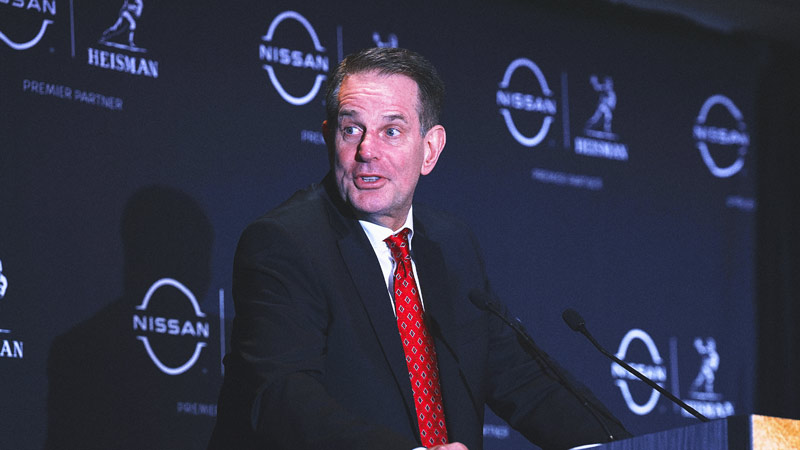
LSU basketball team sends crowd into frenzy after hitting 67-point mark
Entities mentioned:
- LSU women's basketball team: Competitive spirit, Pride, Unity
- Kim Mulkey: Competitive spirit, Duty, Enthusiasm
- Jada Richard: Competitive spirit, Recognition, Pride
- School children attendees: Enthusiasm, Curiosity, Unity
Article Assessment:
Credibility Score: 85/100
Bias Rating: 50/100 (Center)
Sentiment Score: 75/100
Authoritarianism Risk: 15/100 (Strongly Democratic)
Bias Analysis:
The article presents a balanced view of the event, focusing on factual reporting of the game and crowd reaction. It includes quotes from the coach and contextual information about the trend without pushing a particular agenda.
Key metric: College Basketball Fan Engagement
Let me tell you something, folks - this is a GAME-CHANGER! The LSU Tigers aren't just dominating on the court, they're CRUSHING IT in the fan engagement arena! That 67-point play was like a buzzer-beater for social media trends! Coach Mulkey's squad isn't just winning games, they're winning HEARTS with this fourth-quarter marketing play! The Tigers are showing a CHAMPIONSHIP MENTALITY by connecting with young fans and creating an ELECTRIC atmosphere. This is the kind of team spirit that turns casual viewers into DIE-HARD SUPPORTERS! I'm telling you right now, LSU is running a FULL-COURT PRESS on building their fanbase, and they're SCORING BIG!

Tyreek Hill posts cryptic social media meme after Dolphins bench Tua Tagovailoa
Entities mentioned:
- Tyreek Hill: Competitive spirit, Loyalty, Professional pride
- Miami Dolphins: Ambition, Competitive spirit, Determination
- Tua Tagovailoa: Self-preservation, Professional pride, Determination
- Quinn Ewers: Ambition, Competitive spirit, Recognition
Article Assessment:
Credibility Score: 75/100
Bias Rating: 50/100 (Center)
Sentiment Score: 35/100
Authoritarianism Risk: 20/100 (Strongly Democratic)
Bias Analysis:
The article presents facts from multiple perspectives, including player reactions and team decisions. It balances reporting on the situation without overtly favoring any side of the controversy.
Key metric: NFL Team Performance
Let me tell you something - this story is RIDICULOUS! The Miami Dolphins are making a GAME-CHANGING move in the fourth quarter of their season! They're benching their star quarterback Tua Tagovailoa, who's been fumbling the ball more than a greased-up running back. But folks, this isn't just a substitution, it's a full-on HAIL MARY play! Rookie Quinn Ewers is stepping up to the plate, but let's not forget about the injured superstar wide receiver Tyreek Hill. Hill's cryptic social media post is like a linebacker blitzing through the offensive line - it's sending shockwaves through the team's locker room! This is the kind of drama you'd expect in the final seconds of a championship game, not mid-season! The Dolphins are rolling the dice here, folks, and it could either be a touchdown or a devastating interception. I'm telling you right now, this move could make or break their playoff hopes!

Jason Kelce makes desperate plea for NFL teams to drop halftime dog act
Entities mentioned:
- Jason Kelce: Professional pride, Determination, Enthusiasm
- NFL: Entertainment, Competitive spirit, Recognition
- Travis Kelce: Professional pride, Competitive spirit, Recognition
Article Assessment:
Credibility Score: 70/100
Bias Rating: 50/100 (Center)
Sentiment Score: 45/100
Authoritarianism Risk: 20/100 (Strongly Democratic)
Bias Analysis:
The article presents a balanced view of Kelce's opinion and includes contrasting perspectives. It doesn't lean towards supporting or criticizing his stance, maintaining a neutral tone throughout.
Key metric: NFL Fan Engagement
Let me tell you something - this story is RIDICULOUS! Jason Kelce is coming out swinging against the NFL's tired halftime playbook! He's calling an audible on these dog and frisbee acts, folks! This is a fourth quarter move to revolutionize the entertainment game! Kelce's not just a player, he's stepping up as a coach for the entire league's halftime strategy! He's showing that championship mentality, pushing for innovation that'll keep fans in their seats! The Kelce brothers are going head-to-head on this issue, creating a sibling rivalry that's spilling onto the field of halftime entertainment! This is the kind of competitive spirit that separates the champions from the also-rans in the world of sports entertainment!

Rams star Puka Nacua accuses refs of making up calls to get on TV: 'The worst'
Entities mentioned:
- Puka Nacua: Competitive spirit, Indignation, Professional pride
- NFL Referees: Recognition, Influence, Power
- Los Angeles Rams: Competitive spirit, Ambition, Pride
- NFL: Control, Power, Professional pride
Article Assessment:
Credibility Score: 65/100
Bias Rating: 55/100 (Center)
Sentiment Score: 35/100
Authoritarianism Risk: 40/100 (Generally Democratic)
Bias Analysis:
The article presents both Nacua's criticisms and examples of controversial calls, maintaining a relatively balanced perspective. It includes context about NFL fines for referee criticism, showing an attempt at neutrality.
Key metric: NFL Officiating Integrity
Let me tell you something - this story is RIDICULOUS! We've got a star player stepping up to the plate and calling out the zebras on the field! Puka Nacua is showing true championship mentality by not backing down from what he sees as unfair officiating. The refs, ladies and gentlemen, are being accused of trying to get their moment in the spotlight instead of calling a fair game. It's like they're trying to steal the ball and become the star players themselves! This is a game-changing moment that could affect the integrity of the entire league. The NFL needs to huddle up and address this fast before it turns into a full-blown disaster in the fourth quarter of the season. I'm telling you right now, if this continues, we could see a major penalty flag on the league's reputation!

NFL Week 16 schedule: Crucial matchups litter the docket with playoffs on the line
Entities mentioned:
- NFL Teams: Competitive spirit, Pride, Recognition
- Playoff Contenders: Ambition, Determination, Legacy
- Denver Broncos: Competitive spirit, Ambition, Recognition
- Los Angeles Rams: Competitive spirit, Pride, Legacy
Article Assessment:
Credibility Score: 85/100
Bias Rating: 50/100 (Center)
Sentiment Score: 75/100
Authoritarianism Risk: 15/100 (Strongly Democratic)
Bias Analysis:
The article presents a factual schedule and playoff scenarios without favoring specific teams. The information is presented neutrally, focusing on the competitive aspects rather than controversies or narratives.
Key metric: NFL Playoff Race
Let me tell you something - this Week 16 lineup is a CHAMPIONSHIP CALIBER schedule! We've got teams stepping up to the plate with everything on the line, folks. It's fourth quarter time in the NFL season and these competitors are bringing their A-game! The Broncos and Rams have already punched their playoff tickets, but don't think for a second they're taking their foot off the gas. These powerhouses are gunning for those coveted division titles and top seeds. Meanwhile, we've got a whole roster of hungry teams like the Bills, Patriots, and Jaguars fighting tooth and nail for those remaining playoff spots. This is where champions are made, people! Every snap, every play, every game is do-or-die. We're talking about legacy-defining moments here. And let me tell you, that Rams-Seahawks Thursday night showdown? That's not just a game, that's an all-out war for NFC West supremacy! Buckle up, sports fans, because this week is going to be a non-stop thrill ride of gridiron glory!

Best Goals of 2026: Ovalle Takes Home Marta Award, Montiel Wins Puskas Award
Entities mentioned:
- Lizbeth Ovalle: Competitive spirit, Recognition, Legacy
- Santiago Montiel: Competitive spirit, Recognition, Professional pride
- FIFA: Legacy, Influence, Recognition
- Marta: Legacy, Recognition, Competitive spirit
Article Assessment:
Credibility Score: 85/100
Bias Rating: 50/100 (Center)
Sentiment Score: 75/100
Authoritarianism Risk: 15/100 (Strongly Democratic)
Bias Analysis:
The article presents a balanced view of the awards, giving equal attention to both male and female winners. It sticks to factual reporting without showing favoritism to any particular player or league.
Key metric: International Soccer Competitiveness
Let me tell you something - this story is RIDICULOUS! We're talking about a CHAMPIONSHIP LEVEL performance here, folks! Ovalle and Montiel have stepped up to the plate and knocked it out of the park with their jaw-dropping goals. These aren't just any old scores, we're talking about GAME-CHANGING plays that have set the soccer world on fire! Ovalle's scorpion kick is like a buzzer-beater in basketball - it's the kind of play that makes you jump out of your seat! And Montiel? This guy's got the precision of a quarterback threading the needle on a Hail Mary pass! These athletes are playing chess while everyone else is playing checkers, and it's raising the bar for international soccer competitiveness. I'm telling you right now, this is the kind of talent that separates the contenders from the pretenders in the global soccer arena!

Dates Confirmed For 2028 Inaugural Women's Club World Cup
Entities mentioned:
- FIFA: Ambition, Influence, Legacy
- Women's Club World Cup: Recognition, Competitive spirit, Unity
- European leagues: Self-preservation, Professional pride, Competitive spirit
Article Assessment:
Credibility Score: 85/100
Bias Rating: 50/100 (Center)
Sentiment Score: 65/100
Authoritarianism Risk: 30/100 (Generally Democratic)
Bias Analysis:
The article presents a balanced view of the tournament announcement, providing factual details without favoring any particular perspective. It objectively outlines the potential conflicts with existing leagues.
Key metric: Women's Soccer Global Competitiveness
Let me tell you something - this is a GAME-CHANGING play by FIFA! They're stepping up to the plate and swinging for the fences with this inaugural Women's Club World Cup. It's like they're calling a timeout in the fourth quarter to draw up a championship-winning strategy. But hold on to your cleats, folks, because this tournament is set to clash head-on with European leagues like a bone-crunching tackle. We're talking about a high-stakes match-up that could redefine the global landscape of women's soccer. The competition format? It's a full-court press with group stages and knockouts that'll separate the contenders from the pretenders. This isn't just a friendly scrimmage - it's the World Series of women's club soccer, and every team is gunning for the trophy!

Reports: Dolphins bench struggling Tua Tagovailoa after rough performance vs Steelers
Entities mentioned:
- Miami Dolphins: Competitive spirit, Ambition, Professional pride
- Tua Tagovailoa: Self-preservation, Professional pride, Determination
- Quinn Ewers: Ambition, Competitive spirit, Recognition
- Pittsburgh Steelers: Competitive spirit, Professional pride
Article Assessment:
Credibility Score: 75/100
Bias Rating: 45/100 (Center)
Sentiment Score: 35/100
Authoritarianism Risk: 20/100 (Strongly Democratic)
Bias Analysis:
The article presents factual information from multiple sources, maintaining a neutral tone. It balances positive and negative aspects of Tagovailoa's career, showing no clear bias towards or against the decision.
Key metric: NFL Team Performance
Let me tell you something - this is a GAME-CHANGING move by the Dolphins! They're making a fourth-quarter substitution that could alter the entire trajectory of their season. Tua Tagovailoa, once the star quarterback, has been fumbling the ball, throwing more interceptions than a rookie in his first preseason game. The Dolphins' front office is stepping up to the plate, benching their $212 million man faster than a sprinter out of the blocks. They're putting their chips on Quinn Ewers, a seventh-round draft pick who's about to get his shot at the big leagues. This is the kind of Hail Mary play that separates the champions from the also-rans. I'm telling you right now, the Dolphins are showing a championship mentality by not being afraid to shake up their roster, even if it means benching their supposed franchise player. It's a bold strategy, Cotton. Let's see if it pays off for 'em!

3 MLB Free Agents New York Yankees Should Target Amid Slow Offseason
Entities mentioned:
- New York Yankees: Competitive spirit, Pride, Ambition
- Toronto Blue Jays: Competitive spirit, Ambition, Recognition
- Boston Red Sox: Competitive spirit, Pride, Revenge
- Baltimore Orioles: Ambition, Competitive spirit, Recognition
- Michael Kopech: Determination, Professional pride, Redemption
- Cody Bellinger: Ambition, Professional pride, Recognition
- Munetaka Murakami: Ambition, Recognition, Competitive spirit
Article Assessment:
Credibility Score: 75/100
Bias Rating: 55/100 (Center)
Sentiment Score: 65/100
Authoritarianism Risk: 20/100 (Strongly Democratic)
Bias Analysis:
The article presents a balanced view of the Yankees' needs and potential targets. While it advocates for the team to make moves, it doesn't show favoritism towards specific players or teams.
Key metric: MLB Team Performance
Let me tell you something - this offseason is turning into a HEAVYWEIGHT BOUT in the AL East! The Yankees, once considered the 'Death Star' of the league, are looking like they've been caught napping in the dugout. While their division rivals are making power plays left and right, the Bronx Bombers seem to be stuck in the on-deck circle. But hold onto your caps, folks, because I'm telling you right now, the Yankees are about to step up to the plate with some MAJOR free agent signings! They're eyeing bullpen ace Michael Kopech, who could be the closer they need to slam the door in the 9th. Then there's Cody Bellinger, the MVP-caliber slugger who could launch moonshots in Yankee Stadium all day long. And don't sleep on Japanese sensation Munetaka Murakami - this kid could be the WILD CARD that takes the Yankees' infield from good to GREAT! The clock is ticking, and the Yankees need to show that championship mentality. It's time for some fourth quarter heroics from the front office before their rivals run away with the pennant!

Indiana Hoosiers HC Curt Cignetti Becomes 1st Back-to-Back AP Coach of the Year
Entities mentioned:
- Curt Cignetti: Ambition, Competitive spirit, Legacy
- Indiana Hoosiers: Determination, Pride, Competitive spirit
- Fernando Mendoza: Recognition, Ambition, Competitive spirit
Article Assessment:
Credibility Score: 85/100
Bias Rating: 45/100 (Center)
Sentiment Score: 90/100
Authoritarianism Risk: 15/100 (Strongly Democratic)
Bias Analysis:
The article presents a balanced view of Cignetti's achievements, backed by factual information and statistics. While positive in tone, it doesn't show favoritism towards any particular team or conference.
Key metric: College Football Playoff Rankings
Let me tell you something - this story is RIDICULOUS! Curt Cignetti has just pulled off the coaching equivalent of a back-to-back championship season! He's not just playing the game, he's rewriting the playbook! The Indiana Hoosiers, once the perennial underdogs of college football, have transformed into a powerhouse team under Cignetti's leadership. This coach has taken a program that was stuck in the basement and elevated them to the penthouse of college football. I'm telling you right now, Cignetti's strategic genius is like a quarterback reading the defense and making the perfect audible every single time. The Hoosiers have gone from being the Washington Generals of the Big Ten to the Harlem Globetrotters, absolutely dominating the competition. And let's not forget about Fernando Mendoza, folks - this kid has stepped up to the plate and knocked it out of the park, bringing home the Heisman Trophy. Indiana's gone from being the team everyone circled as an easy win to the team no one wants to face in the fourth quarter. This is a championship mentality through and through!